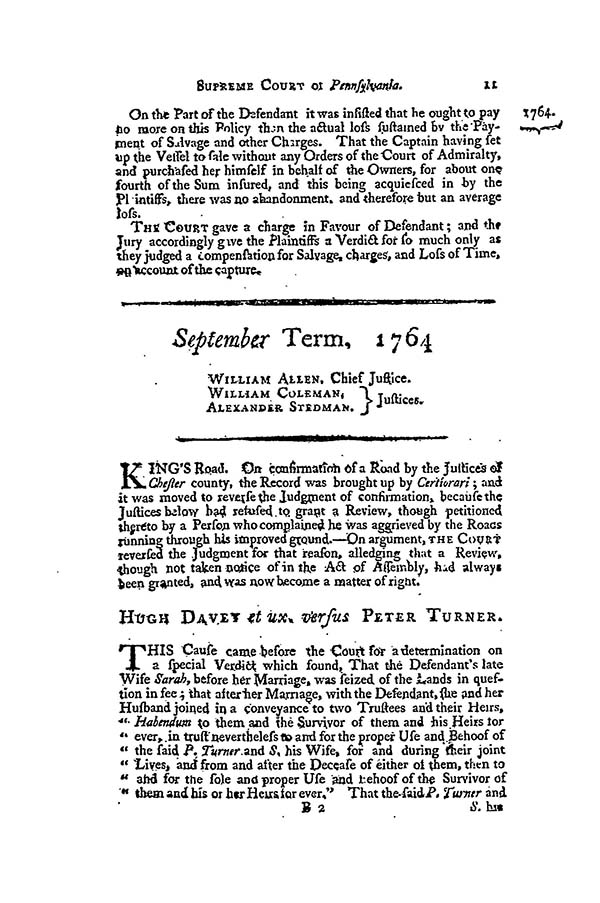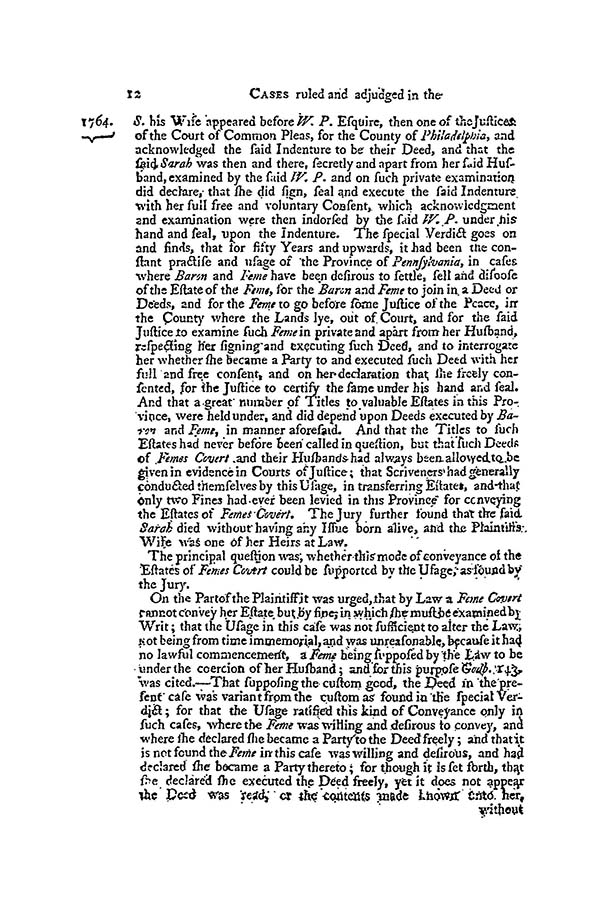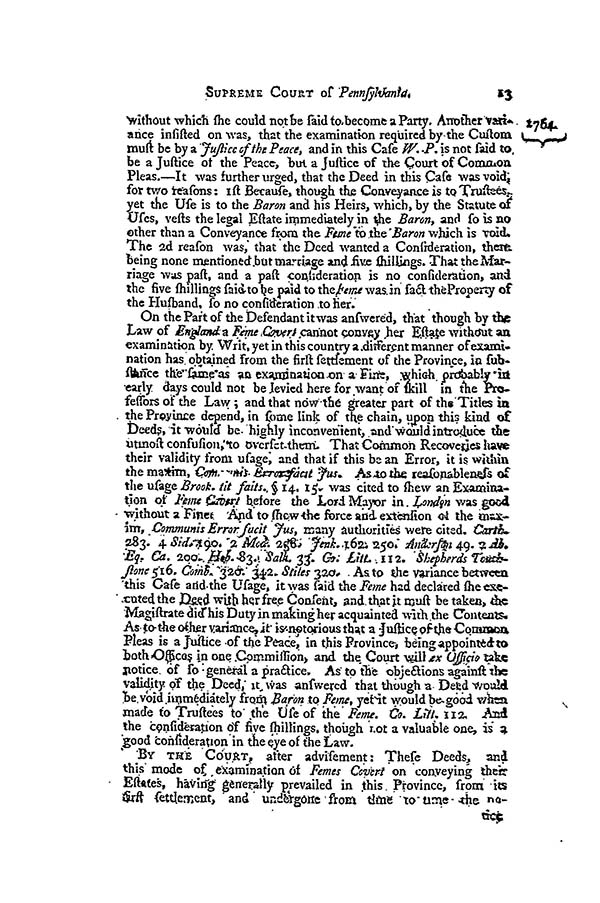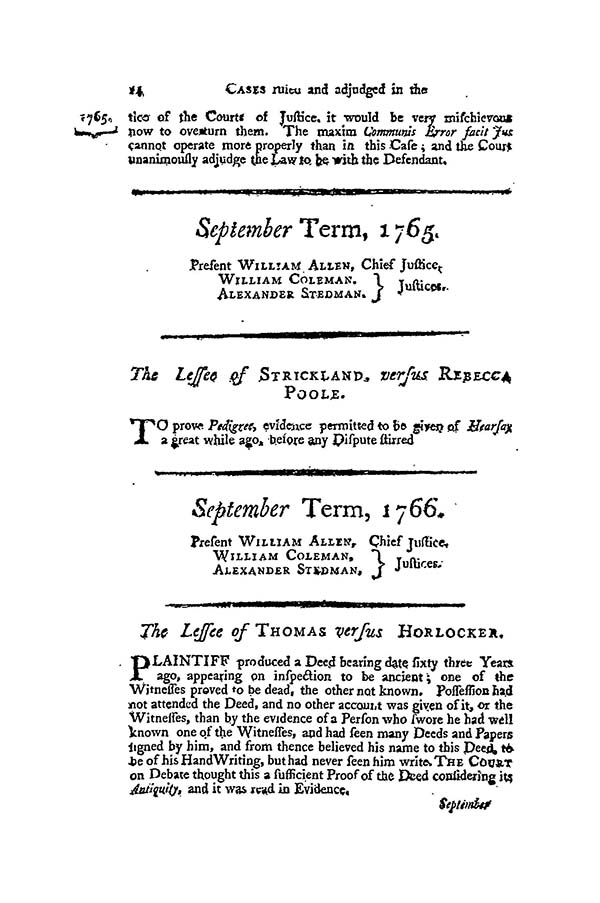Davey v. Turner, 1 Dall. 11 (Pa. 1764)
Supreme Court of Pennsylvania
September Term, 1764.
William Allen, Chief Justice
William Coleman, Alexander Stedman, Justices
King's Road. On confirmation of a Road by the Justices of Chester county, the Record was brought up by Certiorari; and it was moved to reverse the Judgment of confirmation, because the Justices below had refused to grant a Review, though petitioned thereto by a Person who complained he was aggrieved by the Roads running through his improved ground.—On argument, The Court reversed the Judgment for that reason, alledging that a Review, though not taken notice of in the Act of Assembly, had always been granted, and was now become a matter of right.
Hugh Davey et ux. versus Peter Turner.
This Cause came before the Court for a determination on a special Verdict which found, That the Defendant's late Wife Sarah, before her Marriage, was seized of the Lands in question in fee; that after her Marriage, with the Defendant, she and her Husband joined in a conveyance to two Trustees and their Heirs, 'Habendum to them and the Survivor of them and his Heirs forever, in trust nevertheless to and for the proper Use and Behoof of the said P. Turner and
The principal question was, whether this mode of conveyance of the Estates of Femes Covert could be supported by the Usage, as found by the Jury.
On the Part of the Plaintiff it was urged, that by Law a Feme Covert cannot convey her Estate but by fine, in which she must be examined by Writ; that the Usage in this case was not sufficient to alter the Law, not being from time immemorial, and was unreasonable, because it had no lawful commencement, a Feme being supposed by the Law to be under the coercion of her Husband; and for this purpose Godb. 1k3 was cited. That supposing the custom good, the Deed in the present case was variant from the custom as found in the special Verdict; for that the Usage ratified this kind of Conveyance only in such cases, where the Feme was willing and desirous to convey, and where the declared she became a Party to the Deed freely; and that it is not found the Feme in this case was willing and desirous, and had declared she became a Party thereto; for though it is set forth, that she declared she executed the Deed freely, yet it does not appear the Deed was read, or the contents made known unto her,
On the Part of the Defendant it was answered, that though by the Law of England a Feme Covert cannot convey her Estate without an examination by Writ, yet in this country a different manner of examination has obtained from the first settlement of the Province, in substance the same as an examination on a Fine, which probably in early days could not be levied here for want of skill in the Professors of the Law; and that now the greater part of the Titles in the Province depend, in some link of the chain, upon this kind of Deeds, it would be highly inconvenient, and would introduce the utmost confusion, to overset them. That Common Recoveries have their validity from usage, and that if this be an Error, it is within the maxim, Communis Error facit Jus. As to the reasonableness of the usage Brook. tit saits. 14. 15. was cited to show an Examination of Feme Covert before the Lord Mayor in London was good without a Fine. And to show the force and extension of the maxim, Communis Error facit Jus, many authorities were cited. Carth. 283. 4 Sid. 190. 2 Moa. 238. Jenk. 162. 250. Anderson 49. 2 db. Eq. Ca. 200. Heb. 83. Salk. 33. Go. Litt. 112. Shepherds Touchstone 516. Comb. 320. 342. Stiles 320. As to the variance between this Case and the Usage, it was said the Feme had declared she executed the Deed with her free Consent, and that it must be taken, the Magistrate did his Duty in making her acquainted with the Contents. As to the other variance, it is notorious that a Justice of the Common Pleas is a Justice of the Peace, in this Province, being appointed to both Offices in one Commission, and the Court will ex Officio take notice of so general a practice. As to the objections against the validity of the Deed, it was answered that though a Deed would be void immediately from Baron to Feme, yet it would be good when made to Trustees to the Use of the Feme. Co. Litt. 112. And the consideration of five shillings, though not a valuable one, is a good consideration in the eye of the Law.
By the Court, after advisement: These Deeds, and this mode of examination of Femes Covert on conveying there Estates, having generally prevailed in this Province, from its first settlement, and undergone from time to time the notice
Citation: Davey v. Turner, 1 U.S. 11, 1 Dall. 11 (Pa. 1764)




Last modified: December 5, 2014